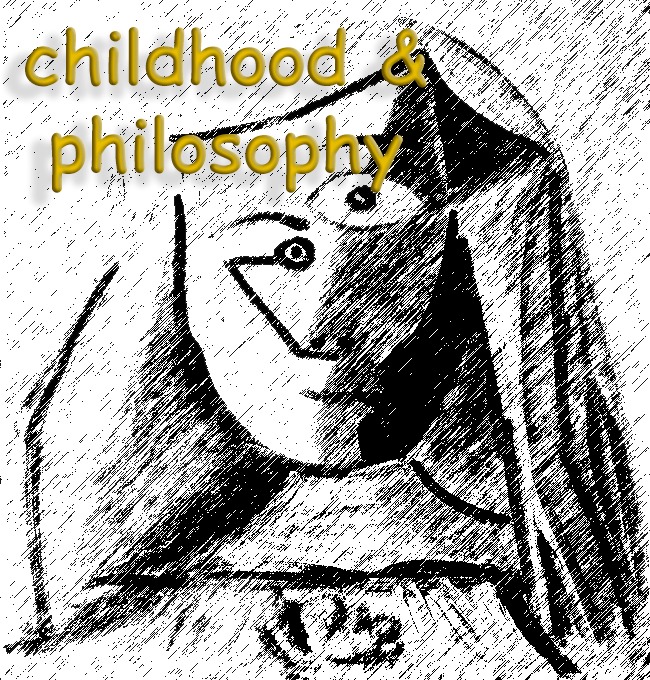‘seeing’ with/in the world: becoming-little
DOI:
https://doi.org/10.12957/childphilo.2021.53695Keywords:
early childhood education, posthumanism, temporal diffraction, Barad, critical geography, subjectivityAbstract
Critical posthumanism is an invitation to think differently about knowledge and educational relationality between humans and the more-than-human. This philosophical and political shift in subjectivity builds on, and is entangled with, poststructuralism and phenomenology. In this paper we read diffractively through one another the theories of Finnish architect Juhani Pallasmaa and feminist posthumanists Karen Barad and Rosi Braidotti. We explore the implications of the so-called ‘ontological turn’ for early childhood education. With its emphasis on a moving away from the dominant role of human vision (knowing and seeing) in educational research we show how videoing and photographing works as an apparatus in an analysis of data from an inner-city school in Johannesburg, South Africa. We are struck by children’s seeing with the ‘eyes of their skin’ (Pallasmaa) and ‘seeing’ with/in the world (posthumanism), as their obvious distress is felt when a small tree sapling has been mowed down in a nearby park. We analyse the event with the help of a variation on Deleuze’s notion of ‘becoming-child’: ‘becoming-little’, and Anna Tsing’s ‘the arts of noticing’. ‘Becoming-little’ as a methodology disrupts the adult/child binary that positions ‘little’, younger humans as inferior to their ‘bigger’ fully human counterparts. We exemplify ‘becoming-little’ through 4 and 5 year-olds’ learning with the little tree and adopt Barad’s temporal diffraction to ‘see’ what is in/visible in the park: the extractive, exploitative, colonising mining practices of White settlers. These are still part of the land on which the park was created but are in/visible beneath the ‘skin’ of the earth.
References
Barad K (2003) Posthumanist performativity: Toward an understanding of how matter comes to matter. Signs: Journal of Women in Culture and Society. 28(31): 801-831.
Barad K (2007) Meeting the universe halfway: Quantum physics and the entanglement of matter and meaning. Durham, NC: Duke University Press.
Barad K (2014) Diffracting diffraction: Cutting together apart. Parallax. 20(3):168-187
Barad K (2017) Troubling time/s and ecologies of nothingness: re-turning, re-membering, and facing the incalculable. New Formations. 92(92): 56-86.
Braidotti R (2013) The Posthuman. Cambridge: Polity Press.
Braidotti R (2018). A Theoretical Framework for the Critical Humanities. Special Issue: Transversal Posthumanities. Theory, Culture & Society, 0(0), 1-31.
Cane J (2019) Civilising grass: the art of the lawn on the South African highveld. Wits University Press.
Dahlberg G and Moss P (2005) Ethics and politics in early childhood education. London: Routledge Falmer.
Deleuze G and Guattari F (1987) A thousand plateaus (B. Massumi, Trans.). Minneapolis: University of Minnesota Press. (Original work published 1980).
Giorza, T. (2018). Making kin and taking care: Intra-active learning with time, space and matter in a Johannesburg preschool. (Unpublished PhD thesis, University of Cape Town)
Lenz Taguchi H (2010) Going beyond the theory/practice divide in early childhood education: Introducing an intra-active pedagogy. London: Routledge.
Murris, K. (2013). The epistemic challenge of hearing child’s voice. Studies in Philosophy and Education. 32(3), 245-259.
Murris, K. (2016). The posthuman child: Educational transformation through philosophy with picturebooks. New York: Routledge.
Murris, K. (2017). Learning as ‘worlding’: decentering Gert Biesta’s ‘non-egological’ education. Childhood & Philosophy, 13(28), 453-469.
Murris, K. and Borcherds, C. (2019). ‘Childing: A different sense of time’. In D. Hodgins (ed.) Feminist Post-Qualitative Research for 21st Childhoods. pp. 197-209. London: Bloomsbury Academic.
Murris, K. & Bozalek, V. (2019) Diffraction and Response-able Reading of Texts: The
Relational Ontologies of Barad and Deleuze. International Journal for Qualitative Studies in Education. 32(7): 872-886. https://doi.org/10.1080/09518398.2019.1609122
Pallasmaa J (2005) The Eyes of the Skin: Architecture and the senses. Chichester, West Sussex: John Wiley & Sons.
Rinaldi C (2006) In dialogue with Reggio Emilia: Listening, researching and learning. London: Routledge.
Sevenhuijsen, S. (1998). Citizenship and the ethics of care: Feminist considerations on justice, morality, and politics. New York: Psychology Press.
Snaza N and Weaver J (2015) Posthumanism and educational research. New York: Routledge.
Springgay S, Irwin RL, and Kind SW (2005) A/r/tography as living inquiry through art and text. Qualitative inquiry. 11(6): 897-912.
Tronto, J.C. (1987). Beyond gender difference to a theory of care. Signs, 12(4), 644-663.
Tronto, J. C. (1993). Moral boundaries: A political argument for an ethic of care. New York: Psychology Press.
Tsing AL (2015) The Mushroom at the End of the World: on the possibility of life in capitalist ruins. Princeton: Princeton University Press.




